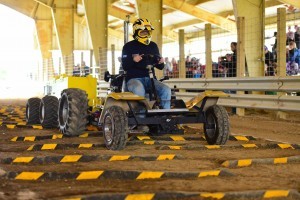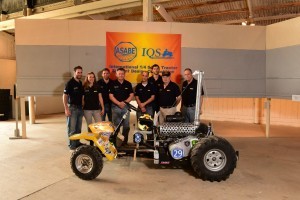TracTech 1st Place in Illinois
An impressive achievement for the Technion in the International Quarter-Scale Tractor Student Design Competition in Illinois
The TracTech vehicle, built by Agricultural Engineering students, won first place in two categories in the competition. The judges’ quote: “never has a team in its first appearance in the competition shown such professionalism and originality”
The TracTech vehicle, built by Technion Agricultural Engineering students, won prizes in the International IQS Competition. The students designed and built the vehicle as part of their final project in the Faculty of Civil and Environmental Engineering.
The IQS Competition (International Quarter-Scale Tractor) was held in Illinois for the 18th consecutive year by ASABE – the American Society of Agricultural and Biological Engineers. The competition is for multifunctional vehicles (platforms) designed and built by student teams from around the world. The Technion team – the first Israeli team to participate in the competition since its inception – won first place in the “Platform testing and development” category and in the “Quiet platform for environmental conditions” category.
The IQS Competition was established by the ASABE in light of the shortage of skilled professionals at major companies such as Caterpillar and John Deere, and out of the desire of these companies to attract talented students. Over the years, participation in the competition has become a “ticket of admission” to these companies. The organizers of the competition provide competitors with a pair of rear tires manufactured by Titan and a 31 HP engine manufactured by Briggs & Stratton. The uniqueness of the competition is that it simulates a completely realistic work environment. Each participating team is required to operate as a company (management, marketing, sales, etc.) that manufactures vehicles in accordance with market requirements and on the assumption that 3,000 units of the product will be sold per-year. In addition to demonstrating the platform’s motor abilities of pulling force and durability (on a tough obstacle course), students are required to cope with a large number of constraints in the areas of design, safety, production process efficiency and vehicle maintenance; and must demonstrate professionalism and originality to convince the experienced judges that their product is successful and economically viable.
Within the framework of competition, the Technion team designed and built a new platform for small agricultural farms which combines the advantages of an All-Terrain Vehicle (speed up to 35 km/h and comfort) with the features of a tractor – high pulling force and also a slow driving (0.5 km/h) for agricultural purposes such as feedstock distribution in a dairy farming. The TracTech platform is cheap self-assembled and easy to maintain.
“For me, this is an extraordinary success,” says Professor Shmulevich, who conceived the idea of training and sending the delegation to the US. “This is the first Israeli delegation in the history of the competition, and it is important to understand that we competed there with about 30 highly experienced teams, with far more significant support and budgeting.”
Work on the project began in November 2014, and involved many individuals and entities in the industry. “On the night of May 25, we flew to Illinois, where we had three days to complete the construction of the platform. Those were days of frenzied teamwork. All the project participants will undoubtedly remember it as a special, professional experience. I hope that the successful outcome will lead to the formation of a new Technion team to build a new platform in preparation of next year’s competition.”
Professor Shmulevich, served as the Technion team’s professional and academic advisor. Ms. Nahum Orlev and Dr. Amos Mizrach served as the students’ professional instructors. The TracTech platform was built with the assistance of Eliasaf Becker (an auto mechanics instructor) and the lab technician of the Machine and Soil-Interaction Lab. at the Faculty of Civil and Environmental Engineering. Additional assistance was provided by the following entities: the Faculty of Civil and Environmental Engineering, the Center for Research in Agricultural Engineering at the Technion, the Grand Technion Energy Program (GTEP), the Institute of Agricultural Engineering – ARO at the Volcanic Center, Scania Israeli Ltd and Zoko Enterprises – Caterpillar Israel Ltd.




